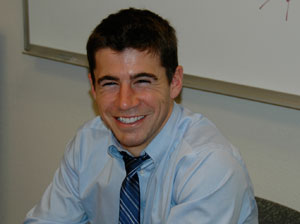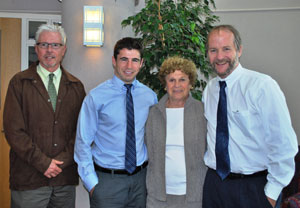Every day in the spring of 2009, Max Caccese would ride in a crowded bus down a pot-holed street leading to one of the worst slums in Lima, Peru. A volunteer health intern, he was there to check blood samples for HIV and hepatitis in a crowded clinic.
"I had to approach everything with an open mind," recalled Caccese, 23, a health sciences major who was chosen to receive this year's Primary Care Physician Award from the Sutter Maternity & Surgery Center (SMSC) and the Central Coast Alliance for Health. Caccese will receive a $10,000 scholarship to help pay for medical school fees and tuition. "I had to push myself outside my comfort zone, and I had to learn to work in an environment that was both poorly funded and ill-equipped."
The award supports a graduating senior with a major in health sciences at UCSC who will be entering an accredited medical school soon after successfully completing his or her bachelor's degree. The recipient's medical training must result in an M.D. or D.O. degree, and the recipient must intend to return to the Central Coast of California to practice in the area of primary care. The funds are intended to help meet the student's requirements for fees and tuition.
Caccese, a native of San Luis Obispo, would like to be a primary care physician working for underserved populations, preferably as part of Doctors Without Borders. Doctors Without Borders/Médecins Sans Frontières (MSF) is an international medical humanitarian organization created in France 30 years ago with a special focus on health issues in Southeast Asia and sub-Saharan Africa.
But first, Caccese said he hopes to return to the Central Coast to practice as a primary care physician after completing his medical training. Before applying to medical schools, he plans to continue working at UCSC faculty member Dr. Martha Zúñiga's immunology lab, and continue to work with mental health patients in Santa Cruz County.
Larry deGhetaldi, M.D., president of the Santa Cruz region of Palo Alto Medical Foundation, said he was impressed by Cacesse's commitment to primary care in underserved areas. "The future of health care reform in this country depends on the resurrection of primary care," deGhetaldi said. "Primary care physicians will be the basis on which we will build the new American health care system. Max epitomizes the kind of physician who will improve outcomes, quality, and service to patients while we make health care more available and more affordable to all Americans."
Caccese's focus changed dramatically while enrolled at UC Santa Cruz. After transferring to the campus from McMaster University in Ontario, Canada, in the summer of 2008 --"I had to move back to California because I liked surfing too much," he explained--Caccese spent several days a week volunteering with Santa Cruz County's Mental Health Recovery Team with the guidance of his recovery team supervisor, Kent Raphael Halpern.
His main job was accompanying clients to health-care appointments. He was struck by the county mental health department's understaffing, the result of a funding crunch. One especially dedicated practitioner kept making time for a patient who was in pain, even though the doctor was triple-booked for the same period of time. For the first time Caccese began to see that underserved areas desperately need more physicians serving on the front lines of health care.
Later, he worked at the Watsonville-based Salud Para La Gente, which provides health care for low-income families. The clinic has a mostly Latino clientele. Migrant worker families make up most of the client list. "The amount of patients seen each day has steadily increased to the point where attending physicians can no longer dedicate sufficient time to each patient," Caccese wrote in his successful award application essay.
Caccese concedes that working, observing, and interning with overworked doctors has complicated his early, idealistic feelings about medicine. But these real-life experiences have not dimmed his commitment to being a doctor. "At the end of the day, your work has to be more than a job," he said. "It has to be something you love."
Candidates for the Primary Care Physician Award are recommended by UCSC's Department of Molecular, Cell and Developmental Biology to a committee comprised of representatives from SMSC, the Alliance, and the Santa Cruz County Health Services Agency. There is no implied obligation or requirement that the award recipient shall be on staff at any particular organization in the area, but he or she will be expected to serve Medi-Cal patients.




